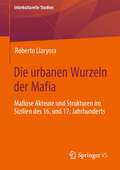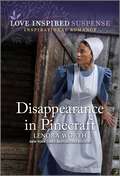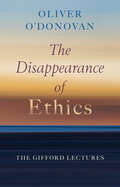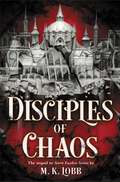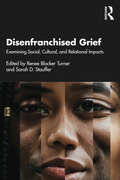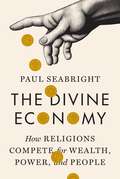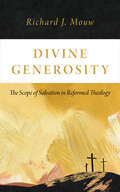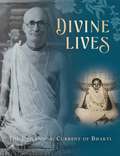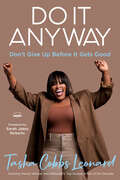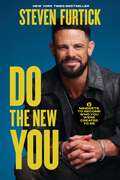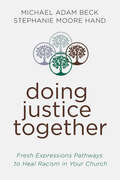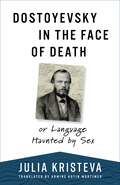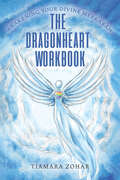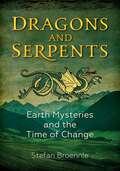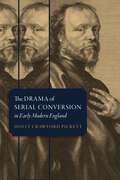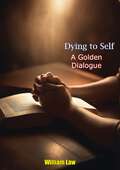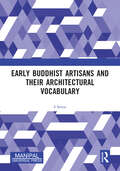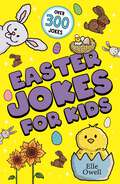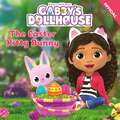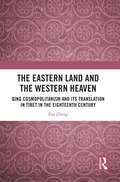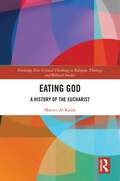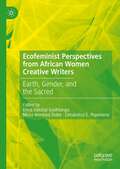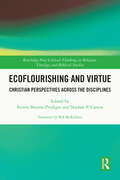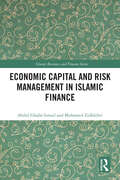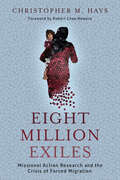- Table View
- List View
Die urbanen Wurzeln der Mafia: Mafiose Akteure und Strukturen im Sizilien des 16. und 17. Jahrhunderts (Interkulturelle Studien)
by Roberto LlaryoraAusgehend von Roberto Llaryoras Fallstudien und seiner Kritik an dem in den Medien und der Wissenschaft vorherrschenden, historisch und ethnographisch verkürzten Mafiabild geht das Buch folgenden Fragen nach:Erstens: Was verbirgt sich eigentlich hinter dem mafiosen Dispositiv, hinter der offenbar sehr eindeutig stadtgesellschaftlich eingebetteten Form gewaltsamer Machtausübung, was macht seine “DNA” aus? Zweitens: Welchen gesellschaftlichen Konstruktionselementen verdankt sich dieses ungewöhnlich flexible und dauerhafte Dispositiv? Drittens: Warum ist das bis in die Öffentlichkeit hinein gepflegte deutlich nostalgisch-kulturalistisch geprägte Mafiabild so resilient gegen jeden Versuch, einen sachadäquaten Zugang zu gewinnen?
Disappearance in Pinecraft
by Lenora WorthHer sister has disappeared…and now her life is on the line.When Adina Maas arrives in Pinecraft to find her missing sister, she&’s blindsided by abductors who attempt to kidnap her. To her surprise, Nathan Kohr, a familiar face from her past, is there to save her. And it&’s clear that whatever trouble Adina&’s sister is in, Adina is now a target, too. But with Nathan&’s help, can they find out who&’s after the Maas sisters before Adina is the next to disappear?From Love Inspired Suspense: Courage. Danger. Faith.
The Disappearance of Ethics: The Gifford Lectures
by Oliver O'DonovanThe capstone lectures of esteemed ethicist Oliver O&’Donovan What is the future of ethics? Oliver O&’Donovan addresses a discipline in crisis in The Disappearance of Ethics. Based on the 2021 Gifford Lectures, this book contends that contemporary ethics has lost its object (good), frontier (time), and agent (person). O&’Donovan traces the development of these concepts from Greek philosophy through early Christianity, the Enlightenment, and into the modern era. Engaging with a range of thinkers including Aristotle, Augustine of Hippo, Max Scheler, Karl Barth, and more, O&’Donovan shows how ethics has lost its heart and how the field can regain its purpose. He completes his lectures by integrating theology and philosophy to recover ethics. Contemplating theological concepts such as creation, divine law, and justification undergirds ethics by generating &“existential wonder.&” With characteristic warmth and scholarly precision, O&’Donovan reinvigorates ethical argument with theological insight. Scholars and students of Christian ethics will find his lectures equally provocative and inspiring.
Disciples of Chaos
by M.K. LobbIn this thrilling sequel to Seven Faceless Saints, Roz and Damian must face their destiny as the world crumbles around them—perfect for fans of Leigh Bardugo and Kerri Maniscalco. Damian Venturi isn't aware of it yet. But as small shifts start to crack the foundations of the Ombrazian power structure after the Rebellion's attack, cracks are beginning to show in Damian's own facade. Uncontrollable anger is bubbling to the surface and can't always be pushed down. Can he keep everyone safe, even from himself? Rossana Lacertosa should feel victorious. She accomplished everything she set out to do, and more. The Rebellion's attack set countless prisoners free and brought attention to the unfairness in the Palazzo's structure. And Damian is back by her side where he belongs. Yet the war with Brechaat rages on and government officials are hellbent on keeping the status quo. Then an Ombrazian general arrives from the front lines, and orders dozens of arrests, shipping Roz and Damian's friends up north. Determined to free those who matter most, Roz and Damian set their sights on Brechaat. But their journey is dogged by strange magic, and Damian shifts further from the boy he used to be. The complications of love, magic, faith, and war will keep readers eagerly turning the pages as they head towards the gripping conclusion in the Seven Faceless Saints duology.
Disenfranchised Grief: Examining Social, Cultural, and Relational Impacts
by Renee Blocker Turner Sarah D. StaufferDisenfranchised Grief expands the professional helper’s understanding of the grief experiences that result from social, cultural, and relational oppression, microaggressions, disempowerment, and overt violence. The authors blend trauma-informed practice and recent research on critical race theory, cultural humility, and intersectionality to both broaden mental health professionals’ conceptualization of disenfranchised grief and its impacts and promote equity and inclusion among populations that have been marginalized.
The Divine Economy: How Religions Compete for Wealth, Power, and People
by Paul SeabrightA novel economic interpretation of how religions have become so powerful in the modern worldReligion in the twenty-first century is alive and well across the world, despite its apparent decline in North America and parts of Europe. Vigorous competition between and within religious movements has led to their accumulating great power and wealth. Religions in many traditions have honed their competitive strategies over thousands of years. Today, they are big business; like businesses, they must recruit, raise funds, disburse budgets, manage facilities, organize transportation, motivate employees, and get their message out. In The Divine Economy, economist Paul Seabright argues that religious movements are a special kind of business: they are platforms, bringing together communities of members who seek many different things from one another—spiritual fulfilment, friendship and marriage networks, even business opportunities. Their function as platforms, he contends, is what has allowed religions to consolidate and wield power.This power can be used for good, especially when religious movements provide their members with insurance against the shocks of modern life, and a sense of worth in their communities. It can also be used for harm: political leaders often instrumentalize religious movements for authoritarian ends, and religious leaders can exploit the trust of members to inflict sexual, emotional, financial or physical abuse, or to provoke violence against outsiders. Writing in a nonpartisan spirit, Seabright uses insights from economics to show how religion and secular society can work together in a world where some people feel no need for religion, but many continue to respond with enthusiasm to its call.
Divine Generosity: The Scope of Salvation in Reformed Theology
by Richard J. MouwA brief, accessible inquiry into the wideness of God&’s mercy in Reformed theology How broad is the scope of salvation? To explore this question, Richard J. Mouw draws on Scripture and a rich heritage of Calvinist theology. Mouw brings voices like the old Princeton theologians, Kuyper, and Bavinck into conversation with more recent voices such as David Engelsma on pertinent topics, including: • The salvation of unbaptized infants • God&’s wrath and love for sinners • Problems with universalism • The number of the elect Learned yet approachable, Mouw explains how Christians can affirm God&’s justice while holding hope for the wideness of his saving mercy. Congregations today face pressing questions about how to reconcile orthodoxy with empathy in increasingly pluralist neighborhoods and communities. For Reformed pastors, students, and interested laypeople, Divine Generosity serves as a biblically based, doctrinally sound guide.
Divine Lives: The Descending Current of Bhakti
by Mandala PublishingDivine Lives recounts the lives and teachings of the venerated spiritual masters His Divine Grace Srila Prabhupada Bhakti Siddhanta Sarasvati Gosvami Thakura, the founder acarya of the entire Gaudiya community, and His Divine Grace Srila Bhakti Pramode Puri Gosvami Thakura, the founding acarya of Sri Gopinatha Gaudiya Matha. The Gaudiya Vaisnava tradition stresses the importance for spiritual seekers to receive transcendental knowledge in a bona-fide current of devotion. Genuine spiritual teachers retain the power and glory of this divine flow in their hearts and manifest it through their unadulterated words and proper conduct. Divine Lives highlights the descriptions of two such sublime personalities, His Divine Grace Srila Prabhupada Bhakti Siddhanta Sarasvati Gosvami Thakura, and his disciple, His Divine Grace Srila Bhakti Pramode Puri Gosvami Thakura. In the time of the Gaudiya revolution led by Srila Prabhupada, Srila B. P. Puri Goswami carried a pen and paper wherever he went. His impeccable notes from that time will surely be of great service for many generations to come. Some of his writings are included within in the form of heart-touching glorifications to his spiritual master that have been organized into separate categories for the reader's benefit. After the biography of Srila Prabhupada and an autobiography of Srila B. P. Puri Goswami, Divine Lives concludes with the words of Srila B. P. Puri Goswami Thakura&’s successor and disciple, Srila B. B. Bodhayan Maharaja. In this last section, we learn specific details about Srila B. P. Puri Goswami&’s first meetings with Srila Prabhupada and how he joined this spiritual movement. Also included within are historical articles from the Gaudiya and Chaitanya Vani that have been translated from the original Bengali into English for the first time, as well as rare photos and artifacts from this transformational time in Gaudiya history.
Do It Anyway: Don't Give Up Before It Gets Good
by Tasha Cobbs LeonardIn this inspiring guide to the power of faithful resilience, Tasha Cobbs Leonard—Grammy Award winner and Billboard&’s Gospel Artist of the Decade—shares the secret that helps her persevere: When saying yes to God doesn&’t make sense, do it anyway.&“Prepare to be invigorated to claim every promise, realize every dream, cast aside every excuse, and embrace every God-given desire within your heart.&”—Travis and Jackie Greene, pastors of Forward City ChurchPastor, entrepreneur, and gospel music icon Tasha Cobbs Leonard tells of journeying through moments of unforeseen challenges while holding to an unshakable God and discovering that our greatest breakthroughs come when we make the courageous choice to show up and do hard things anyway. Tasha tells remarkable stories of experiencing this firsthand when she committed to dreams even when they seemed unrealistic, pursued adoption though it looked impossible, navigated the dynamics of a blended family despite challenges, and watched God move in each step of endurance through infertility and depression.With true testimony and conviction, Tasha inspires you toward a bolder way of life with the promise that it will always be worth it on the other side. Along the way, she equips you with practical tools to help you • Dream big with God again• Focus on God&’s direction over the loudness of the world • Never forget God&’s faithfulness, especially in the midst of your hopelessness• Don&’t let fear of failure force you to quit on your miracle too soon• Believe firmly that no mess and no amount of pain is beyond God&’s redemptionWhether you&’re feeling stuck, stressed, or simply weary—there&’s a more a hopeful way to live, a bolder way to believe. To follow God when the way seems impossible, persevere in faith even when the odds are stacked—this is what it means to &“do it anyway.&”
Do the New You: 6 Mindsets to Become Who You Were Created to Be
by Steven FurtickNew York Times bestselling author and pastor Steven Furtick shows readers how to find their God-given identity and to grow into the person God designed them to be all along. Do you ever get a glimpse of yourself that is exactly who you want to be, but always seems just out of reach? The happier, kinder, less stressed, more courageous you? The ideal version of you isn't imaginary at all. It's actually the authentic you trying to break through. And it&’s not a future version of yourself you have to chase. The true you may be new to you, but it&’s not new to God. It's the you he knew all along. In Do the New You, New York Times bestselling author and pastor Steven Furtick speaks directly to the challenge of living out your God-given identity and calling. He explores and unpacks six practical mindsets everyone can adopt to get from who you are today to where God is taking you. These six statements are truths you can speak over yourself any time and anywhere: • I&’m not stuck unless I stop. • Christ is in me. I am enough. • With God there's always a way and by faith I will find it. • God is not against me, but he's in it with me, working through me, fighting for me. • My joy is my job. • God has given me everything I need for the season I&’m in. These simple, powerful, memorable phrases will shift your focus, feelings, and actions to align with God&’s vision of you. God isn&’t just calling you to do you. He&’s calling you to do the new you—the unique and powerful person he created you to be. A Study Guide is also available for purchase. A Spanish edition, ¡Renuévate!, is also available for purchase.
Doing Justice Together: Fresh Expressions Pathways for Healing in Your Church
by Michael Adam Beck Stephanie Moore HandTransform your church with grace.Doing Justice Together introduces a process using Scripture as a souce of inspiration and instruction for pastors and church people to move through together, to re-envision and reorient themselves away from old, harmful habits. Beck and Hand show pastors how they can, over time, lead the congregation to become a place where racial harmony, justice, and liberation are intrinsic to the structure and life of the church. The authors lay out four pathways for discerning and correcting the unjust patterns that often sneak into church life unnoticed. They also share other leaders’ stories from a variety of settings where this process has led to healing, revival, and hope.Following the pathways, pastors and congregants will be equipped to thoughtfully transform their church. They’ll make changes with grace and care, honoring and including longtime members. And they’ll begin new ministries—perhaps reaching people they could never have imagined reaching before--becoming a fresh expression of church in their community.
Dostoyevsky in the Face of Death: or Language Haunted by Sex (European Perspectives: A Series in Social Thought and Cultural Criticism)
by Julia KristevaJulia Kristeva has been both attracted and repelled by Dostoyevsky since her youth. In this extraordinary book, by turns poetic and intensely personal, she brings her unique critical sensibility to bear on the tormented and visionary Russian author.Kristeva ranges widely across Dostoyevsky’s novels and his journalism, plunging deep into the great works—and many of the smaller ones—to investigate her fascination with the Russian author. What emerges is a luminous vision of the writer’s achievements, seen in a wholly new way through Kristeva’s distinctive perspective on language. With her keen psychoanalytical eye, she offers brilliant insights into the passionate heroines of the great novels. Focusing on Dostoyevsky’s polyphonic writing, Kristeva also demonstrates the importance of Orthodox Christianity throughout his body of work, analyzing the complex ways his carnivalesque theology informs his fiction and commentary.An original and profound interpretation of one of the nineteenth century’s greatest writers, this book’s insights are also relevant to the twentieth and twenty-first centuries—up to our unsettled present, to which Kristeva’s humane reading of the suffering Russian author brings understanding and even solace.
The Dragonheart Workbook: Awakening Your Divine Merkabah
by Tiamara ZoharThe writing of The Dragonheart Workbook was commissioned by the Galactic Council of Alpha Draconis. It is presented in two main sections: ‘The Teachings of the Divine Feminine’ and ‘The Teachings of the Divine Masculine’. Including 25 meditations gifted from the ascended masters, angelic realms and galactic emissaries, The Dragonheart Workbook is an ideal follow-up to books that have been channelled from galactic sources, especially the Pleiadian Emissaries and Archangels.
Dragons and Serpents: Earth Mysteries and the Time of Change
by Stefan Broennle• Explains how dragons and serpents are bearers of the elemental and archetypal energies of the Earth • Examines myths, legends, and symbols of dragons and serpents in many cultures, including their positive associations in Asia and their often misinterpreted negative meanings in Christianity • Reveals the geomantic meaning of dragon energy and how to reconnect to it for supporting the Earth in these times of change Revealing how dragons and serpents are deeply embedded in the story of humankind and the Earth itself, from prehistory to the present, Stefan Broennle takes us on a journey through the myths, legends, symbols, and geomantic powers of dragons in different cultures around the world. He shows how the ancient image of the dragon and the serpent are closely connected with each other. He explains how dragons are archetypes of the elemental force of the Earth, while the serpent, which can change its skin and regenerate, carries the elemental force of rebirth and is also connected to the Earth through its relationship with the feminine. Looking at lore from Europe and Asia, he shows how in Christian cultures, dragons and serpents were often connected to dark and evil forces whereas in Asia the dragon is considered the bearer of culture, the founder of countries, or even the primal father of the people. The author examines ancient pictorial representations of dragons on buildings and in paintings, interpreting their different forms and unveiling their hidden meanings. Illuminating the meanings of dragons in geomantic symbolism, he explains the differences between dragon paths, soul paths, and ley lines, which form an energetic network all over the globe. He shows how our ancestors recognized the dragon-earth energies of these energetic lines and identified them with dragon place names or sculptures at precise geographical points. He explains how dragon portals can be opened through geomantic work and includes a powerful exercise to awaken the dragon energies within you and connect more deeply to the Earth. Presenting a gateway into the ancient power of dragons, this book reveals how reconnecting with the archetypal Earth energies of dragons and serpents is crucial not only for our individual growth and transformation but also for the fate of humanity and the Earth during our present times of great change.
The Drama of Serial Conversion in Early Modern England
by Holly Crawford PickettIn The Drama of Serial Conversion in Early Modern England, Holly Crawford Pickett reconceptualizes early modern religious identity by exploring the astonishing stories of serial converts: historical figures such as William Alabaster, Kenelm Digby, William Chillingworth, and Marc Antonio De Dominis, along with fictional ones, who changed their religious affiliations between Catholicism and Protestantism multiple times. Pickett argues that serial converts both reveal and helped revise early modern understandings of the self. Through investigation of the techniques that serial converts used to stage and justify their conversions, Pickett demonstrates the performative nature of the act of conversion itself, offering a counternarrative to the paradigm of sincere, private conversion that was on the rise in the tumultuous years following the Reformation. Drawing from archival investigation into the lives and works of serial converts and performance studies theory, this book shows how the genres and conventions associated with conversion shaped not only forms of communication but also the very experience of conversion. By juxtaposing plays about serial conversion—by Thomas Dekker and Philip Massinger, Thomas Middleton, Elizabeth Cary, Ben Jonson, and William Shakespeare—with spiritual autobiographies, Pickett highlights the shared task of convert and playwright: performing conversion for an audience.Serial converts served as uncomfortable reminders to their contemporaries that religious identity is always unverifiable. The first study to explore serial conversion as a discrete phenomenon in this era, The Drama of Serial Conversion in Early Modern England challenges confessional divisions within much early modern historiography by analyzing the surprising convergence of Protestant and Catholic in the figure of the serial convert. It also reveals a neglected strain of religious discourse in early modern England that valued mutability and flexibility even in the midst of hardening and increasingly narrow understandings of conversion.
Dying to Self A Golden Dialogue: A Golden Dialogue (1898)
by William LawThis classic Christian book combines the work of two famous authors from the past: Andrew Murray (a famous South African preacher and writer born in the 1800s) and William Law (a priest from the Church of England born in the 1600s).In it, Andrew Murray provides commentary on the work of William Law which tackles a very difficult subject for many Christians: dying to self. First published in the 1800s, “Dying to Self” is one of Murray’s (and Law’s) lesser known works. Though written many years ago, Murray’s comments on Law’s insightful text have been “pure gold” to the hearts of numerous readers.The conversational style of the book between two people (Eusebius and Theophilus) seeking further enlightenment on the topic was written by Law, with explanations provided by Murray. Law’s wisdom, combined with Murray’s commentary, makes for an excellent treatment of the subject which will be especially helpful to Christians who don’t fully understand what “dying to self” really means. The good news, as Murray so expertly points out, is that this “dying to self” can and will be wrought by the Spirit of God when we surrender to Him. Fans of Murray’s book on Hebrews (“The Holiest of All”) will recognize that “Dying to Self” further clarifies Murray’s teachings as expounded in that book.-Print ed.
Early Buddhist Artisans and Their Architectural Vocabulary
by S SettarThe early Buddhist architectural vocabulary, being the first of its kind, maintained its monopoly for about half a millennium, beginning from the third century BCE. To begin with, it was oral, not written. The Jain, Hindu, and other Indian sectarian builders later developed their vocabulary on this foundation, though not identically. This book attempts to understand this vocabulary and the artisans who first made use of it. Print edition not for sale in South Asia (India, Sri Lanka, Nepal, Bangladesh, Pakistan and Bhutan)
Easter Jokes for Kids: Over 300 egg-cellent jokes! (Joke Books for Kids)
by Elle OwellHow do you send a letter to the Easter bunny?By hare mail!What do you call a mischievous Easter egg?A practical yolker!Entertain your friends and family with these side-splitting jokes, guaranteed to add eggs-tra fun to Easter!This joke book is packed with over 300 hilarious jokes about chocolate eggs, the Easter bunny and springtime silliness. These jokes will be the hoppiest addition to your Easter celebrations, guaranteed to bring joy to the whole family.
The Easter Kitty Bunny (DreamWorks Gabby's Dollhouse #4)
by Official Gabby's DollhouseWhen Gabby unboxes an Easter basket with an egg inside, all the Gabby Cats want to know what will hatch. But when the egg rolls away, Gabby and Pandy must go on a springtime search through the Dollhouse to find it. Will they find the Easter Kitty Bunny along the way?
The Eastern Land and the Western Heaven: Qing Cosmopolitanism and its Translation in Tibet in the Eighteenth Century
by Fan ZhangThis book sheds light on the structure of “a unity with diversity” developed in the Qing imperial formation (1636–1912) by a case study of the Qing-Tibetan encounters in the eighteenth century. By analyzing historical and ethnographical materials, the book investigates the translation of Chinese histories and stone inscriptions into Tibetan, the transformation of the landscapes at Mount Wutai and Lhasa, and the transplantation of Chinese deities and medical practices to Tibet. It demonstrates the processes in which the cosmopolitan interlocutors reified imperial integrity while expressing their diverse longings and belongings. It concludes that the Qing’s rule over its cultural others was neither simply Sinicizing nor colonizing, but a translational process in which multivocalic actors shared narratives, landscapes, and practices, while the emperor and tantric masters performed cosmic power over humans and metahumans. This book cuts across the fields of anthropology, history, Chinese Studies, and Tibetan Studies. It reflects on the concepts of sovereignty and ethnicity, and it also extends the methodological horizon of historical anthropology.
Eating God: A History of the Eucharist (Routledge New Critical Thinking in Religion, Theology and Biblical Studies)
by Matteo Al KalakEating God examines the history of the Eucharist as a means for understanding transformations in society from the late Middle Ages onwards. After an introduction on the sacrament from its origins to the Protestant Reformation, this book considers how it changed the customs and habits of society, on not only behavioural and imaginative levels, but also artistic and figurative level. The author focuses on Counter-Reformation Italy as a laboratory for the whole of Christendom subject to Rome, and reflects on how, even today, the transformations of the modern age are relevant and influence contemporary debate. This book offers an innovative path through the history of a sacrament, with consideration of its impact as an ‘object’ that was used, venerated, eaten, depicted and celebrated far beyond the sphere of liturgical celebration. It will be particularly relevant to those interested in cultural history and the history of Christianity.
Ecofeminist Perspectives from African Women Creative Writers: Earth, Gender, and the Sacred
by Enna Sukutai Gudhlanga Musa Wenkosi Dube Limakatso E. PepeneneThis volume explores contemporary African women’s creative writing, highlighting their contributions to ecofeminist theology. Contributors address the following questions: How do contemporary African women writers depict the Earth/land/environment and its relationship to women in various contexts? How is religion featured in African women’s writing? How does religious literature (scriptures) form an intertextual layer in African women’s writing? The contributors proceed by analyzing the intersection of religion, gender, class, sexuality, colonialism, and ecology in selected texts written by African women. They bring these texts into conversation with broader eco-feminist theological scholarship, exploring the potential of literary writing to contribute to theological discourse of liberation and social justice in the African and global arena.
Ecoflourishing and Virtue: Christian Perspectives Across the Disciplines (Routledge New Critical Thinking in Religion, Theology and Biblical Studies)
by Steven Bouma-Prediger Nathan P. Carson Bill McKibbenThis book brings together the interdisciplinary reflections of Christian scholars and poets, to explore how ecological virtues can foster the flourishing of our home planet in the face of unprecedented environmental change and devastation. Its central questions are: What virtues are needed for us to be better caretakers of our home planet? What vices must we extinguish if we are to flourish on the earth? What is the connection between such virtues and vices and the flourishing of all creatures? Each contribution offers insight on ecological virtue ethical questions through disciplinary lenses ranging from biology, geology, and economics, to literature, theology, and philosophy. The chapters feature the legacy and lessons of senior scholars reflecting on a lifetime of earthkeeping work, highlight global concerns and perspectives, and include compelling poetic reflections. Focusing on the way in which human vices and virtues drive so many of our ecological problems and solutions, the volume engages timely issues of environmental importance – such as environmental racism, interfaith dialogue, ecological philosophies of work and economics, marine pollution, ecological despair, hope and humility – encouraging fresh reflection and action. It will be of interest to those working in theology and religious studies, philosophy, ethics, and environmental studies.
Economic Capital and Risk Management in Islamic Finance (Islamic Business and Finance Series)
by Abdul Ghafar Ismail Muhamed ZulkhibriEconomic capital is the subject of great debate among academics and professionals in the field of risk management. Conceptually, Islamic finance's encouragement of risk-sharing eliminates the debt burden encountered by the conventional banking sector. The majority of the Islamic banking system is based on equity-based financing. To be effective in practice, a variety of well-functioning institutions are required to translate Islamic banking concepts into a 'real-world' financial system. In spite of this, the regulatory, legal, product and operational requirements specific to Islamic banks may necessitate a distinct strategy for managing capital-related risks. This book provides a comprehensive review of the theoretical and practical aspects of Islamic economic capital in relation to contemporary Islamic finance.Drawing on the risk-sharing concept, this book delves into the core concept of economic capital from an Islamic perspective, including comparisons to conventional finance theory. Furthermore, it introduces alternative models and offers practical examples to strengthen the regulation and supervision of the Islamic banking system. It also addresses critical policy challenges concerning economic capital in Islamic finance, especially in dual banking countries. This book seamlessly integrates new theory with empirical insights and discusses emerging themes, including stress testing and Shari'ah compliance issues. Most of the chapters are illustrated with real-world cases and practical examples.This book is intended for advanced degree students in finance, and investment professionals, as well as financial practitioners and advisors, particularly those who are pursuing Islamic economics and finance courses.
Eight Million Exiles: Missional Action Research and the Crisis of Forced Migration
by Christopher M. HaysHow researchers used Missional Action Research to make a real difference for displaced persons in Colombia Christian scholars are often motivated to live the gospel by serving the vulnerable. But how do we put our academic research to practical use to help those in need? Christopher M. Hays explains how his interdisciplinary team of theologians, social scientists, pastors, and local partners combined efforts to support internally displaced persons of Colombia. Over eight million people have been driven from their homes by violence perpetrated by paramilitary and guerilla groups in the past two decades. The Colombian government is unequipped to deal with the sheer magnitude of the crisis. To serve displaced persons in a more robust and holistic way, the Faith and Displacement project developed Missional Action Research. This innovative method incorporated direct leadership and participation from local churches and displaced persons with stakes in the research process. The resulting curriculum covered: • Training in trauma-informed mental health care • Harnessing the unrecognized skills and resources of the community • Empowering displaced people economically through microenterprises and other ventures • Supporting participants with effective spiritual and pastoral care Weaving survivors&’ firsthand testimony with interdisciplinary theology, Eight Million Exiles will impress readers with the urgency of this conflict and inspire them with the model developed to address it. Let a small seminary in Medellín show you how to make a tangible difference in vulnerable communities.
